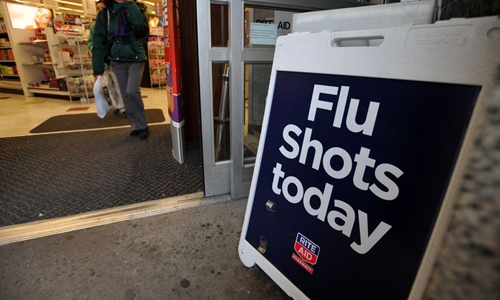HOME >> OPINION
US criticism toward China reveals a country unwilling to learn
By Xu Liang Source:Global Times Published: 2020/2/9 17:54:36

A sign advertising the availability of flu shots is put outside a CVS pharmacy store in New York, the US, January 15, 2013. (Xinhua/Wang Lei)
The Chinese government and people are going all out to fight against the novel coronavirus epidemic. The international community, represented by the World Health Organization (WHO), has sent goodwill. Many friendly countries have also offered China assistance. Supporting China in the fight against the virus has turned out to be a form of "political correctness" among the international community.
However, some senior officials in Washington have made hurtful insults and inappropriate statements that only added to China's suffering. The US prohibited foreigners traveling from China within the past 14 days from entering the country. And some US media outlets have used the epidemic as an opportunity to attack the Chinese government.
Why does the US, a country that claims to have the strongest medical and healthcare facilities worldwide, behave this way?
As a matter of fact, many loopholes could be found within the US public health emergency capabilities. Criticizing China's response capabilities during a public health emergency shows the US' narrow-mindedness and lack of confidence.
Coordination in the US between the federal and state governments is poor. The country's public health emergency management system was established on the basis of separation between federal and state power. Local governments and private sectors hold the majority of the power when responding to emergencies.
With the scale and diversity of emergency response networks increasing, coordination has become problematic in the US.
The 2009 H1N1 pandemic had drawn attention over the threat posed by public health events. The US federal government had taken steps to strengthen the role of the Department of Health and Human Services and the Department of Homeland Security. However, the federal system makes it difficult for fragmented emergency networks to be enhanced by new institutions, technologies, or platforms. The US federal government's efforts to improve efficiency have produced little effect.
The rigid US administration has belatedly implemented emergency measures, and its capacity to allocate emergency funding is restricted. According to the US Centers for Disease Control and Prevention (CDC), the 2009 H1N1 pandemic infected 59 million Americans and killed 12,000 by March 2010. The crisis can be attributed to the US government's poor coordination and lack of funding.
Due to little public participation and the government's lack of mobilization abilities, measures responding to public health emergencies in the US are ineffective. Unlike China's results-oriented management system, the US pays more attention to a procedure's perfection and transparency. In particular, as public health events involve privacy, local governments and rescue agencies are often reluctant to take steps out of legal concerns.
In addition, because of overemphasis on private property rights in the US, it is hard to ensure that medical supplies can be transported in a timely manner during emergencies.
During the current influenza season, the CDC has estimated that at least 13 million people have been infected, with 120,000 hospitalized, and roughly 6,600 killed. Even though, the US government has yet to identify it as a public health emergency.
The US has done a poor job with its post-disaster reconstruction efforts. After an infectious disease breaks out, the US Congress can hardly offer sustaining emergency funds due to partisan struggles, not to mention corresponding medical assistance for uninsured victims.
Besides, scientific research is often unable to keep up with tackling a public health crisis in the country. The US government has been encouraging private sector involvement in formulating medical countermeasures including drugs and vaccinations. But with little commercial profit, research on these products progresses slowly.
After years of development, China's public health emergency management system has made significant progress. Yet the US continues to turn a blind eye to the advances China has made, while loopholes in its own public health emergency systems have caused the US government to overreact in its response to the ongoing novel coronavirus epidemic.
In terms of public health emergency response, each country has its advantages and challenges.
Compared with the US, China has a stronger system that can better mobilize the public and is better at responding in a timely and effective manner. For the US, when facing public health emergencies, it would be smarter if it cooperated with and learned from China rather than trying to isolate and attack China.
The author is an associate professor at School of International Relations, Beijing International Studies University, and a visiting scholar at the University of Iowa. opinion@globaltime.com.cn
Posted in: ASIAN REVIEW